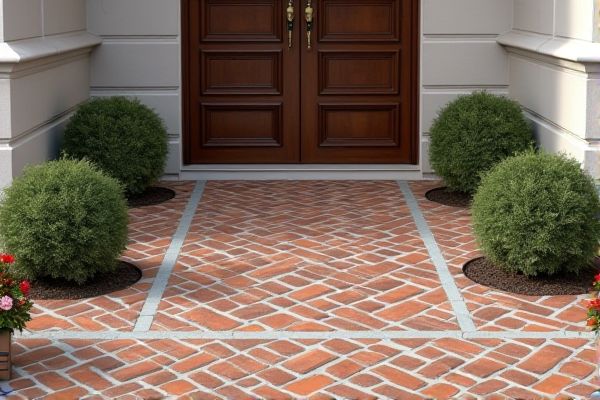
Herringbone brick porch flooring offers a visually striking pattern that adds texture and a classic feel, while straight brick provides a clean, simple, and timeless look with easier installation and maintenance. To discover which brick pattern best suits your porch's style and functionality, continue reading for a detailed comparison.
Table of Comparison
| Feature | Herringbone Brick | Straight Brick |
|---|---|---|
| Pattern | Interlocked V-shaped, diagonal layout | Linear, uniform rows |
| Visual Appeal | Dynamic, eye-catching design | Simple, traditional look |
| Slip Resistance | Higher due to angled bricks | Moderate |
| Installation Complexity | More complex, time-consuming | Easy and quick |
| Durability | Excellent, distributes weight evenly | Good, but less weight distribution |
| Maintenance | Requires regular inspections for shifting | Minimal maintenance |
| Cost | Higher due to labor intensity | Lower, budget-friendly |
| Ideal Use | Decorative porch flooring, patios | Functional porch flooring, pathways |
Introduction to Herringbone and Straight Brick Porch Flooring
Herringbone porch flooring features an intricate zigzag pattern created by laying rectangular bricks at 45-degree angles, adding visual interest and a sense of movement to your outdoor space. Straight brick flooring involves laying bricks in linear rows, providing a classic, clean look that enhances durability and ease of installation. Both options offer unique aesthetic and functional benefits, with herringbone emphasizing decorative appeal and straight brick focusing on straightforward design and stability.
Visual Appeal: Herringbone vs. Straight Brick Patterns
Herringbone brick patterns create a dynamic, intricate visual appeal with their zigzag arrangement, adding texture and sophistication to your porch flooring. Straight brick patterns offer a clean, classic look with uniform lines that can make the space appear more orderly and spacious. Choosing between herringbone and straight brick influences the overall aesthetic, balancing complexity and simplicity based on your design preference.
Installation Process: Complexity and Time Comparison
Herringbone brick patterns require more precise alignment and careful cutting, making the installation process more complex and time-consuming compared to straight brick layouts. Straight brick flooring offers a simpler, faster installation due to its uniform, linear arrangement that demands less intricate measurements. Your choice between the two will impact labor costs and project duration based on the pattern intricacy.
Durability and Strength: Pattern Performance
Herringbone brick patterns provide enhanced durability and strength for porch flooring due to the interlocking design that evenly distributes weight and resists shifting under pressure. Straight brick patterns are simpler but tend to be less effective at load distribution, making them more susceptible to movement and cracking over time. The zigzag layout of herringbone not only improves structural integrity but also offers superior resistance to wear compared to straight brick installations.
Cost Differences: Material and Labor Considerations
Herringbone brick flooring typically incurs higher costs than straight brick due to more complex installation patterns requiring skilled labor and increased time. Material costs may be similar per brick, but the precise cutting and layout for herringbone patterns often lead to higher waste and additional expenses. Homeowners should budget for premium labor rates and potential material overage when opting for herringbone over straight brick porch flooring.
Slip Resistance and Safety Factors
Herringbone brick patterns provide enhanced slip resistance on porch flooring due to their interlocking design, which creates more friction and reduces the risk of slipping. Straight brick layouts, with uniform linear joints, may offer less traction and can become slippery when wet. Your choice between herringbone and straight bricks should consider these safety factors to ensure secure footing, especially in areas exposed to moisture.
Maintenance Requirements for Each Pattern
Herringbone brick patterns for porch flooring require more attentive maintenance due to their intricate layout, which can trap dirt and debris in the angled joints, needing frequent cleaning and sealing to prevent weed growth and moisture damage. Straight brick patterns offer easier upkeep with simpler grout lines that allow for straightforward sweeping and pressure washing, reducing the risk of dirt accumulation and water infiltration. Both patterns benefit from regular inspections and resealing to maintain durability and appearance, but herringbone's complexity demands slightly more diligent care.
Suitability for Different Architectural Styles
Herringbone brick patterns offer a timeless, classic appeal suitable for traditional, rustic, or European-inspired architectural styles, adding visual interest with its intricate zigzag design. Straight brick layouts provide a clean, modern look that complements contemporary, minimalist, or industrial exteriors, emphasizing uniformity and simplicity. Your porch flooring choice should align with the overall architectural style to enhance curb appeal and create a cohesive aesthetic.
Resale Value and Curb Appeal Impact
Herringbone brick patterns enhance curb appeal with their intricate, timeless design that creates visual interest and elevates porch aesthetics, often increasing your home's resale value. Straight brick layouts offer a classic, clean look that appeals to buyers seeking simplicity and symmetry, contributing positively to marketability. Choosing herringbone over straight brick can differentiate your property, making it more memorable and potentially fetching a higher price in competitive real estate markets.
Choosing the Right Brick Pattern for Your Porch
Selecting between herringbone and straight brick patterns for porch flooring hinges on aesthetic appeal and durability requirements. Herringbone offers a dynamic, interlocking design that enhances structural strength and resists shifting, ideal for high-traffic porches. Straight brick patterns provide a classic, clean look with easier installation, suitable for minimalist or traditional porch styles.
 homyna.com
homyna.com